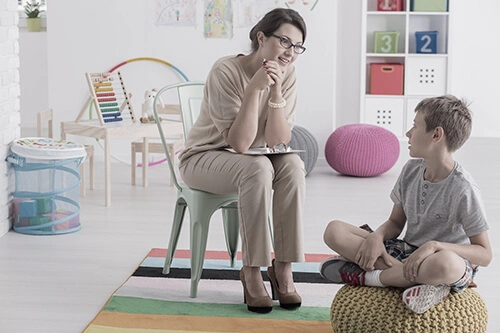Influence and Involvement of Child Psychologists in Custody Decisions in NJ
Divorce frequently involves deeply emotional issues, and one of the most contentious aspects is child custody. The New Jersey Family Courts make decisions based on the child’s best interests. Parents are treated as equals and have the right to engage in their child’s life and make important decisions regarding their child’s care and education. Making custody decisions can be particularly challenging in a high-conflict divorce. Although the supposed goal is to reach a parenting arrangement that is best for everyone involved, uncompromising attitudes and vindictive decision-making can result in an ongoing custody battle that pulls the focus away from the children. One parent’s fitness, or lack thereof, may be called into question by the other when petitioning the court for sole custody. Another parent may not be willing to see their children less than they are accustomed to. This hostile foul play can leave everyone involved battle-worn and exhausted.
Child psychologists play a crucial part in providing objective evaluation results and professional recommendations for a parenting plan. Diagnostic tests and interviews are used to assess each parent’s strengths and weaknesses and the overall emotional well-being of the parents and the children. They can evaluate each family member’s social, emotional, and cognitive development and make recommendations to the court accordingly.
Different Ways a Child Psychologist can Become Involved in a Custody Case
A child psychologist may be requested by one parent, both parents, or the court. Depending on the focus of the investigation, the psychologist may evaluate all family members, just the children, or just the parents. They may also evaluate stepparents or stepchildren of the families involved. Caregivers, especially young children, are sometimes included in the process. The court views a psychologist as someone who has the clinical and practical skills to provide a scientifically sound approach to glean parent attributes, weaknesses, and psychological needs while assessing the emotional and psychological health of the child, resulting in a plan that fits each one.
Parents may hire a psychologist to address the emotional and mental well-being of their children during the divorce and as custody arrangements are discussed. A high-conflict divorce can place emotional pressure on children to pick one parent over the other, leading to anxiety, stress, and depression. If a parent claims there is abuse or neglect on the part of their ex, a psychologist can conduct a series of evaluations to assess that possibility. It is common during a hotly contested divorce for parents to accuse each other of doing horrible things as a way to punish them, prevent them from obtaining custody, or cause more emotional harm. Unfortunately, it frequently ends up harming the children more than anyone else. No one wins from false allegations.
Procedures and Insights of Forensic Psychologists in Family Law Issues
A child psychologist will conduct interviews, observations, and psychological assessments to understand the family dynamic and the child’s visitation needs. The goal is to create a profile for each family member that expresses their attitudes, values, expectations, and needs. The profile will register the parents’ fitness and suggest the best circumstances for the child. Other factors, such as the child’s age, ability to communicate, and special needs (either as the result of the divorce or permanently), are frequently addressed.
This process can take several months, and multiple interviews, each with a different focus, may be conducted. The interviews and evaluations will occur without parental supervision unless the child is very young. Psychologists may interview teachers, extended family members, neighbors, and others with close knowledge of the family. They may also look into the parents and the child’s school, job, or medical records. They may request special permission to observe the child in school or during extra-curricular activities.
Psychological Assessments to Profile Parents and Understand the Child’s Perspective
Parents are usually asked to participate in various psychological assessments to create a parent profile that allows the psychologist to suggest a parenting plan. The Minnesota Multiphasic Personality Inventory (MMPI-2) evaluates cognitive function and identifies psychological disorders, while the Million Clinical Multiaxial Inventory (MCMMI-3) uses 175 true/false questions to help find personality disorders. Previously, the Rorschach Inkblot Test was used, but it is now considered too subjective to provide exact information. The Bricklin Perceptual Scales (BPS) analyzes the child’s perception of her parents using 64 questions that require the child to draw pictures and participate in short storytelling activities.
How Forensic Psychologists Inform Custody Decisions in New Jersey
Significant results include the psychological profile of each family member and how they relate to one another, which covers attitudes, parenting styles, needs, expectations, and communication skills. Based on the findings, parents will be assessed as to their fitness, and the profile will highlight the ideal situation for the child. The child’s behaviors, development, emotional well-being, and other important factors will be considered when making any recommendation for parenting time. The child’s preferences as to the custody arrangement are frequently considered as well.
The judge is the only person who can make a definitive decision about child custody. The information provided by the psychologist provides a foundation for determining custody using the best interests standard. The judge may consider all or only a part of the findings. Psychological test results cannot predict future behaviors, but they can show a pattern of thought and actions that would lead to the safest decision for the child.
The Significance of Carefully Selecting a Child Psychologist for Your Custody Case
Each parent may choose their psychologist, or one will work with the entire family. The psychologist the parents choose must be a good fit for everyone involved. They should also have excellent qualifications, extensive experience in the family courts, and are licensed to practice in New Jersey. They should communicate effectively and offer a variety of techniques and assessments to create a balanced evaluation. When choosing a psychologist, some essential characteristics to look for are experience in high-conflict divorce and separation and experience working with the courts. Double-check their credentials. Where did they receive their training? What kind of counseling do they specialize in? It is essential to ask if they have been designated an expert and received specialized training in these areas. A knowledgeable psychologist will request as much background on the family as possible and contact information of teachers, relatives, coaches, etc., in case an interview is necessary.
The Psychologist’s Challenge in Maintaining Objectivity when Their Conclusions Bear so Much Weight in Court
Psychologists with experience in family law have many tools and years of practice that can all but extinguish any bias. Still, as human beings, there is always some tiny level of preconceived notion that can affect an outcome, even minimally. Gender bias is a common hurdle when women and men are held to a different standard. When gender bias affects custody decisions, mothers are viewed as the primary caretakers, while fathers are rarely considered for that role. Cultural bias can influence decisions regarding education, religion, and gender roles when custody is decided. The bias leans toward a Western cultural view as the preferred environment when this bias is not kept in check. Bias from the assessment data collected may occur when a therapist draws conclusions based only on test results. Connected to this bias is the confirmatory bias, when a therapist uses the assessment and interview results to support a conclusion they had already drawn without the necessary analysis.
The Power of a Collaborative Legal and Psychological Approach
A high-conflict divorce presents many challenges, especially when child custody is an issue. Ensuring that a child’s best interests are protected should be the focus of the court, your attorney, and a psychologist as they work together. A psychologist and attorney want what is best for your child to repair and heal child-parent relationships. They will collaborate to formulate a case strategy and synthesize the information gathered to support your case.

Speak with a Custody Lawyer about Engagement of a Forensic Psychologist in Your Case in New Jersey
Nothing is more important to you than your children and their well-being. When it comes to child custody issues in a high-conflict divorce, sometimes there is no easy solution. During this stressful time, we can give you the guidance and expertise to resolve your custody issues. At the Montanari Law Group, we know how child psychologists become engaged in custody battles and family law issues. We also fully understand the difference their insights and recommendations can make in your case. Having an unbiased expert who informs the court regarding your child’s best interests can either help or hinder your ability to obtain your desired outcome when such an important part of your life and your family’s future is hanging in the balance. Our lawyers have the knowledge and experience to support you during this stressful process, whether your issue is child custody, related evaluations by forensic psychologists, or a custody modification. We proudly serve clients in Caldwell, Montvale, Paramus, Totowa, Haledon, Wyckoff, Millburn, and throughout Passaic County, Bergen County, Essex County, and surrounding areas in New Jersey. Contact us today by calling (973) 233-4396 to request your free consultation with an attorney on our team.

